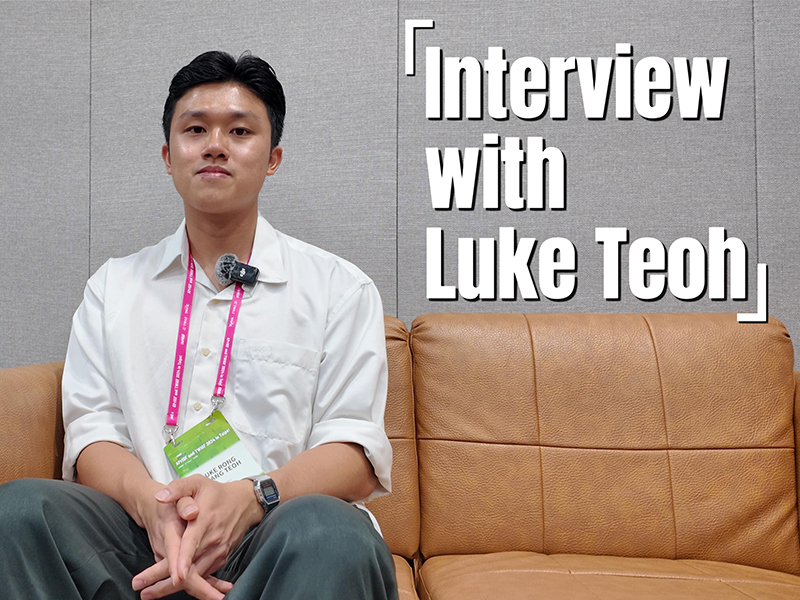- Luke Teoh highlights the importance of youth involvement in internet governance, particularly in balancing cybersecurity and user privacy.
- The integration of AI in language learning and the focus on green technology in technology development are key trends Luke discusses.
Luke Teoh, a Research Assistant at Universiti Sains Malaysia and a NetMission Ambassador, is at the forefront of technological change, particularly in the Asia-Pacific region. With experience in internet governance and research, Luke brings a youthful perspective to issues like cybersecurity, AI, and digital inclusivity. His active involvement in initiatives such as the Asia Pacific Regional Internet Governance Forum (APrIGF) highlights his commitment to fostering positive change in the digital space. We sat down with Luke to explore these important topics and hear his views on the future of technology.
Q: Could you briefly introduce yourself and your work?
Luke Teoh:
Hi everyone, I’m Luke, and this year, I’m joining APrIGF as a fellow and a member of the organising committee for the Youth Internet Governance Forum (yIGF). In today’s digital age, young professionals are driving technological change and societal progress with their skills and passion. I’m honoured to contribute to internet governance and digital content creation across various international platforms.
Q: As someone deeply involved in internet governance, how do you think the balance between cybersecurity and user privacy can be maintained in today’s online environment?
Luke Teoh:
Balancing cybersecurity and user privacy requires a multi-stakeholder approach, which we champion at the Internet Governance Forums, whether regional or global. We must bring together all voices in the community to ensure everyone’s perspective is heard. The youth, in particular, need to be part of these discussions, not as mere token participants but as valuable contributors. Their involvement will help create an internet that is not only secure but also aligned with their needs and expectations.
Many young people today spend a significant amount of time online, so their input is critical to achieving a balance. We need to avoid overregulating content while providing enough privacy for them to navigate the internet safely. The internet is for everyone, so it’s vital we respect and include all voices.
Q: You’ve conducted research on the use of AI in education. How do you see its role, particularly in language learning?
Luke Teoh:
I’ve been working on a research project with one of my professors at Universiti Sains Malaysia to assess whether language students are ready for AI and whether they can use it ethically. AI can certainly help with language learning, but the key is ensuring students know how to use it properly. Language learning is often seen as something that happens in the classroom, but to truly master a language, you need organic interactions. AI can be integrated to make the learning process more natural and less formal, which will help students learn better.
Q: At APrIGF, digital inclusivity is a key focus. What challenges does the Asia Pacific region face in enhancing digital access and how can they be addressed?
Luke Teoh:
Inclusivity is essential, especially for marginalised communities like the youth. It’s important to bring their voices to the table, not just for one event but consistently. Geographic representation across the Asia Pacific region is another challenge. Many people from the Pacific islands, for instance, struggle to attend these events due to logistics and visa issues. The APrIGF Organising Committee is working hard to address this by ensuring equal representation, but there’s still work to be done.
Q: Environmental sustainability is also a hot topic. How can companies and institutions integrate sustainability into their technological development?
Luke Teoh:
Sustainability in technology is crucial, and NetMission.Asia is leading by example. We developed the Eco-Internet Index (EII), which we presented at the Internet Governance Forum (IGF) in Kyoto. The internet can have a positive impact on the environment, and we should use it to drive sustainability. It’s important to recognise both the downsides and the potential for good when it comes to the internet’s impact on our planet.
Q: Lastly, do you have anything else you’d like to share?
Luke Teoh:
I would encourage everyone to subscribe to the NetMission Newsletter, which I manage. We’re always open to feedback, and we love hearing from our readers. Also, the NetMission Academy 2025 is now open for registration. It’s a great programme focused on capacity building for young people in the Asia Pacific region, and I hope to see many of you apply!
Personal Take
Luke Teoh’s passion for involving youth in internet governance is deeply personal. He advocates for the inclusion of young voices in cybersecurity and privacy discussions, stressing that they are the ones most impacted by today’s digital landscape. His efforts reflect the belief that digital policy should be crafted with the participation of all generations, particularly those who will shape its future.
In addition to his governance work, Luke is researching AI’s role in education, particularly in language learning. He believes AI can enhance organic learning experiences but must be used ethically. Luke’s experience as a researcher at Universiti Sains Malaysia brings an informed perspective on how emerging technologies should be integrated into everyday life.
On the topic of sustainability, Luke highlighted NetMission.Asia’s initiative—the Eco-Internet Index—as an example of how the internet can be used for environmental good. His focus on real-world impact demonstrates his commitment to leveraging technology for positive change.

